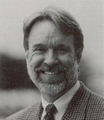IFREE/ESI Lecture Series Presents Keith Murnighan, Ph.D.
March 9, 2012
Mar. 9th, Keith Murnighan, Ph.D. – On Greed – Watch Lecture
 Dr. Keith Murnighan, a guest of the IFREE/ESI Lecture SeriesAbstract: Greed is a central element in human existence. It is also frequently mentioned as a factor in many recent organizational and financial scandals. Thus, it was surprising to discover that empirical research on greed is rare. In contrast, however, a variety of different literatures present a rich conceptual foundation for understanding the dynamics of greed and greedy behavior. We focus on four of these literatures, broadly defined as historical/philosophical, economic, political, and social psychological/game theoretic, to investigate the concept of greed. We identify and explore three of its major characteristics, i.e., its moral, cognitive, and emotional elements. In addition, we present a decision process model to synthesize and analyze the dynamics of intuition, emotions, and reasoning that contribute to or inhibit greed. In essence, our discussion addresses the genesis, the catalysts, and the ramifications of greed.
Dr. Keith Murnighan, a guest of the IFREE/ESI Lecture SeriesAbstract: Greed is a central element in human existence. It is also frequently mentioned as a factor in many recent organizational and financial scandals. Thus, it was surprising to discover that empirical research on greed is rare. In contrast, however, a variety of different literatures present a rich conceptual foundation for understanding the dynamics of greed and greedy behavior. We focus on four of these literatures, broadly defined as historical/philosophical, economic, political, and social psychological/game theoretic, to investigate the concept of greed. We identify and explore three of its major characteristics, i.e., its moral, cognitive, and emotional elements. In addition, we present a decision process model to synthesize and analyze the dynamics of intuition, emotions, and reasoning that contribute to or inhibit greed. In essence, our discussion addresses the genesis, the catalysts, and the ramifications of greed.
Bio – J. Keith Murnighan is the Harold H. Hines Jr. Distinguished Professor of Risk Management at the Kellogg School of Management, Northwestern University. He earned his Ph.D. in social psychology from Purdue University. Prior to joining Kellogg in 1996, he taught at the Universities of Illinois and British Columbia. He has also had visiting appointments at the London Business School, the Center for Advanced Study in the Behavioral Sciences at Stanford, the University of Warwick, Coventry, England, Ecole Superieure des Sciences Economiques et Commerciales (ESSEC) outside Paris, and the Fuqua School of Business at Duke University.
His papers have been published in many different academic journals, primarily in organizational behavior, social psychology, and economics. His most recent edited books are Social Psychology and Economics (with David De Cremer and Marcel Zeelenberg: Lawrence Erlbaum, 2006) and Social Psychology and Organizations (with David De Cremer and Rolf van Dick; Routledge, 2011).